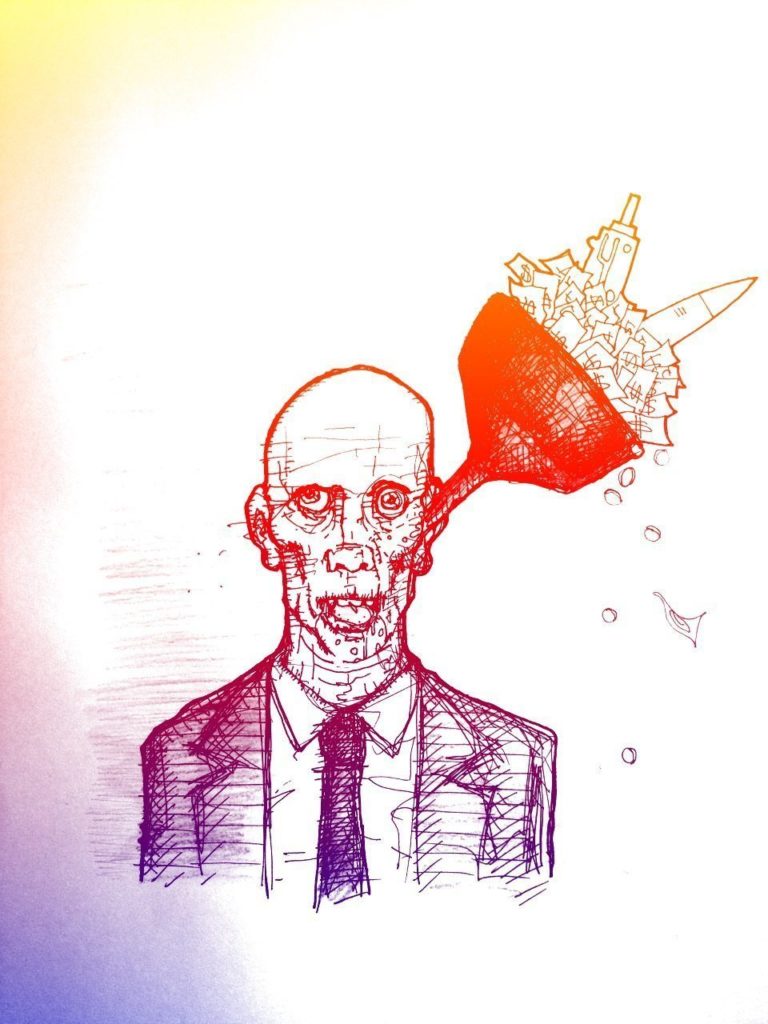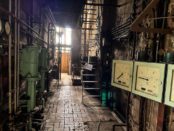[dropcap style=”font-size:100px; color:#992211;”]I[/dropcap]t is only when one chooses to dismiss the cracked brain guardians of perpetual and displaced fear – personal and collective – does one regain the ability to move freely in the world.
The shackles upon one’s incarcerated heart are broken. One is free to be held in the embrace of the present moment. The future, less circumscribed by an oppressive legacy, can unfold like the dawn of a newborn day.
Experiencing fear does not amount to weakness; instead, when buffeted by fear, courage entails putting one foot in front of the other. Attempting to banish fear from consciousness is not a viable option.
It is not possible to obliterate angst and trauma by an evocation of will. Even if they appear to be banished, they will return as kvetching ghosts and keening demons of the mind. Your heart will be haunted by their unaddressed grievances.
[quote]It is a dangerous
thing to fear the
uncertainty inherent
to freedom[/quote]
How can the U.S. not be a haunted land? The country’s blood-soaked soil chants songs of lamentation. Corpse choruses comprised of African slaves and Indigenous People wail out imprecatory hymns from the tormented earth beneath us. As, all the while, the voices of those slaughtered worldwide by our pursuit of empire surround the nation in an enveloping, raging nimbus of accusation.
Is it any wonder that we, as a people, are so prone to collective panic?
You cannot outrun a ghost that has taken possession of your heart. You must hear his grievances, grieve with him over the injustices inflicted upon him, then sing him to the next world. And to ensure he will not return to haunt you: You must tell his tale and due it justice.
If you refuse, as we have on a collective basis in the U.S., you will live out your days in a haze of nebulous dread, and the empire’s vast armaments and the entire apparatus of the national security/surveillance state will not serve to placate your unease.
Because what is lost to time can never be retrieved, memory is a ghost. This is the reason the past is our constant companion. We hear these ghosts within the melancholic sigh that brings up short a moment of laughter, as ghosts within mourn things irretrievable.
Secrets do not remain buried. Their voices, vaulted just beneath the contours of one’s awareness, filter up from the underworld. When we catch a snatch of their murmurings, inchoate longing transforms into nebulous dread.
We panic in the market place at noonday; the heat of eros can only be experienced in acrimony e.g., a nation with millions of unacknowledged Indian dead buried in its soil finds an inexhaustible supply of enemies abroad.
The ground is not solid, when it has been seeded with the restless dead. At any moment, the earth beneath one’s feet threatens to give way. What you bury sans ceremony will in turn bury you. The dead will bring you down to their level for a chthonic tête à tête.
Late empire is a charnel house. Within its confines, the dead become one’s most ardent suitors. And this is the reason:
“Secrets, silent, stony sit in the dark palaces of both our hearts: secrets weary of their tyranny: tyrants willing to be dethroned.” —James Joyce, Ulysses
It is a dangerous thing to fear the uncertainty inherent to freedom; this is the means by which freedom is exchanged for a sense of false security. As a consequence, one sense of proportion is thrown askew.
For example, an American is ten thousand times more likely to be killed or injured at work than in an act of terrorism (and that does not include the dangers involved in commuting back and forth to and from the workplace and the stress related pathologies and premature death resultant from life squandered as an economic animal).
How about let’s declare a War on Work. Let’s have a nationwide mass mobilization for inspired leisure. In this case the terrorists (i.e, the economic terrorists) truly do hate us for our freedoms.
It is a given in human affairs that we will be guided by our misapprehensions of one another. We receive fragments of information through a lens of bias. We stumble through life blinkered by preconceptions.
We come upon others whose self-deceptions match our own (in form, of course, but not matching content) and we express bafflement at the extent of their fatuousness.
So it goes with human interactions, from brief encounters to decades in a marriage bed.
Yet, when you embrace the impossible nature of it all, a breakthrough of sorts occurs. When you become willing to admit fallibility, to bask in the warm glow of your bafflement, another fallible soul is apt to be drawn to you seeking a communion of restorative confusion. Comforted by mutual, benign bafflement (a given when confronted with the sublime) each relaxes enough to notice and be drawn close to the mysterious heart of the other.
Although we are convinced we experience anxiety due to the unpredictable nature of life and the impossibility of apprehending the future, what we are often anxious about is the nettling knowledge that the world we cling to is subject to ineluctable forces of change.
[quote]An American is
ten thousand times
more likely to be
killed or injured
at work than in
an act of terrorism [/quote]
Often, the greater the imperative to view the world with new sight, the more blinkered and myopic one’s vision becomes. We clutch a handful of dust. Rather than revisiting and remaking the world anew, we spend our hours in desperate devotion to constructing and dwelling in a crumbling mausoleum of doomed conceptions.
Late U.S. Empire is a cult of death. The body count rises in direct proportion to the putrefying, nationalist myths we insist on holding sacrosanct.
Ask me about my sense of patriotism, and you will receive only silence… because what does not exist cannot speak.
But ask me about my sense of affinity with the whole of humanity—about the golden fire of our imagination that binds us to all things, about the cathedral of our bones that binds us to the sorrows of the earth—only if you desire to risk having your ear bent beyond repair by my soliloquies.
Fate will favor those who maintain their dignity, retain their sense of humour, and struggle to keep alive their sense of beauty, even in ugly times.
Hold to your vital centre, stay in the vivid moment, if only for the sake of those you love.
Illustration by Dan Booth
Part 1 of this article appeared on Saturday, 4th May
Phil Rockstroh is a poet, lyricist and philosopher bard living in New York City.
Yet a bio amounts to dharma for dimwits: It defines a human being in the same manner and degree of veracity as a restaurant menu describes the various slabs of meat offered … commodified things that were once living beings.



















